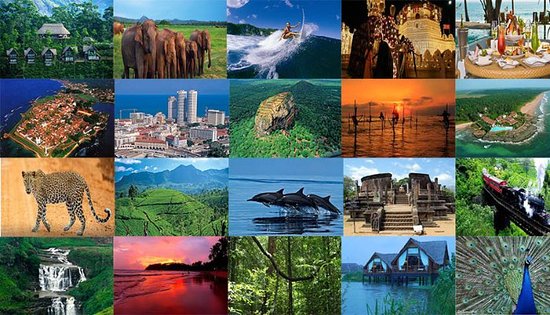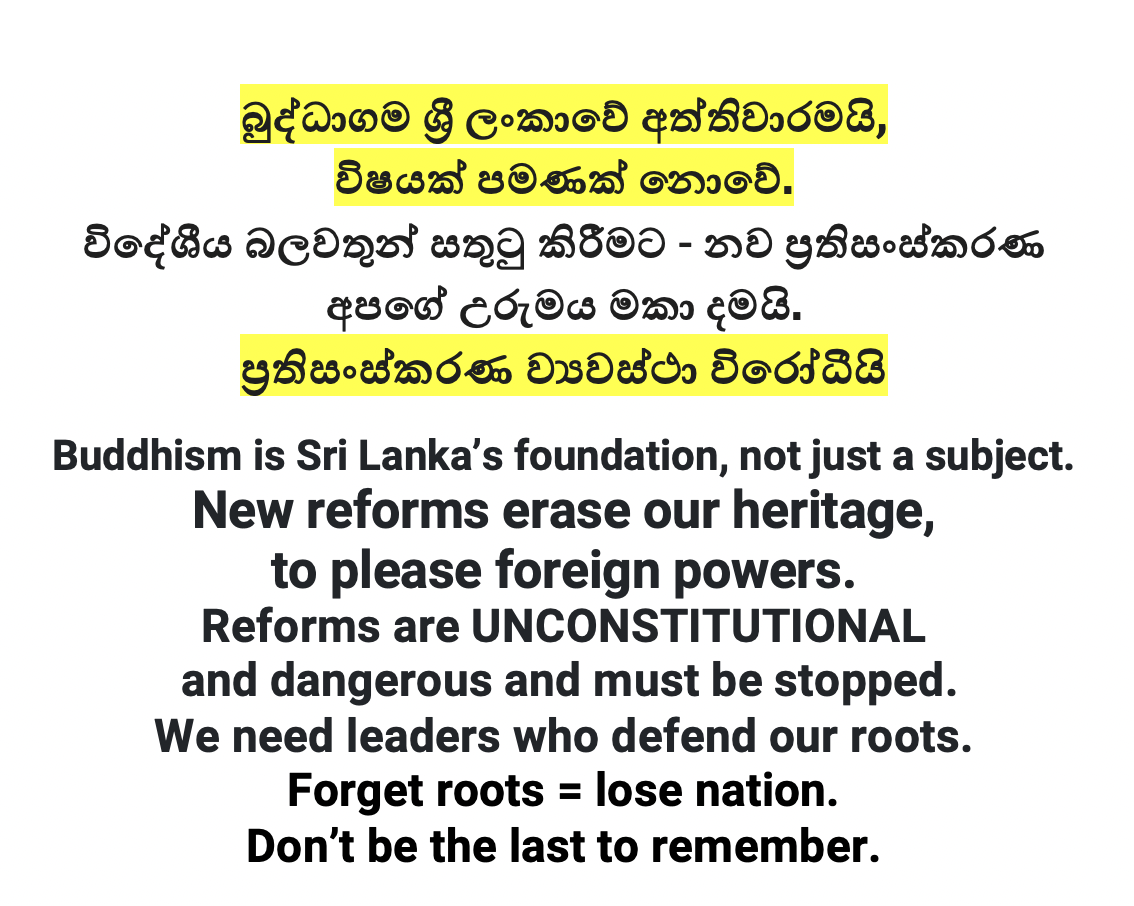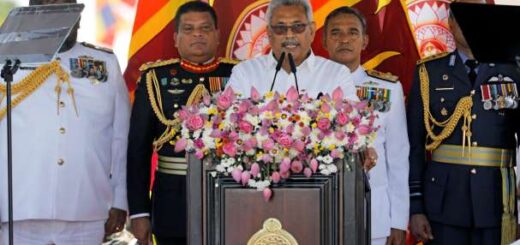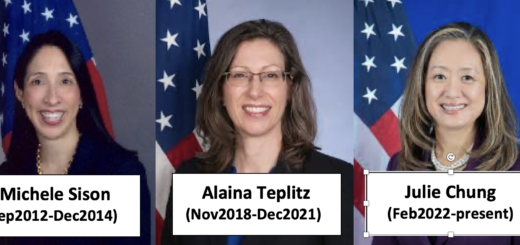Uphold the Rule of Law: A call to Sri Lankan authorities to enforce justice without bias or delay on tourist Visa violations

Sri Lanka is a nation proud of its rich culture, deep religious traditions, and warm hospitality. Tourists from around the world come here to experience our heritage, natural beauty, and vibrant society. Yet, with this privilege comes responsibility — every visitor must respect and abide by Sri Lanka’s laws, customs, and visa regulations. Unfortunately, violations of these rules—whether through ignorance or willful disregard—are increasingly common, threatening our social fabric, security, and international reputation.
The rule of law is the cornerstone of a sovereign nation. It guarantees that every individual—citizen or visitor—is held accountable to the same legal standards, protecting national security, social harmony, and justice without exception. It is imperative that all relevant Sri Lankan authorities — including the Ministry of Foreign Affairs, Department of Immigration and Emigration, Sri Lanka Tourism Development Authority, Sri Lanka Police, and Ministry of Tourism — act decisively and uniformly to enforce laws and visa conditions against all tourists without exception.
Sri Lankans traveling abroad abide by strict rules and regulations governing their conduct. Our citizens face limitations on carrying religious artifacts, bringing traditional foods, and undergo rigorous security screenings that may intrude on personal privacy. They respect foreign laws prohibiting working, preaching, or conducting business on tourist visas.
If Sri Lankans must respect such laws abroad, the same standards must unquestionably apply to all foreign visitors entering Sri Lanka. No exceptions. The law is universal and reciprocal — those who come to our shores on tourist visas must strictly abide by Sri Lankan laws and visa conditions, including the prohibition on unauthorized work, business activities, religious preaching, or any economic activity.
Tourists must respect Sri Lanka’s cultural and religious norms
Foreign tourists on tourist visas must adhere to the legal framework governing their stay. However, reports and observations reveal numerous violations occurring under the guise of tourism — activities that threaten our economy, culture, and sovereignty:
- Working without proper permits or engaging in business activities on tourist visas, which is illegal.
- Operating as tour guides or running transport services such as tri-shaws
- Renting or leasing properties with the intent to sublease for commercial gain, violating visa conditions.
- Establishing or funding unauthorized religious activities, prayer centers, or proselytizing on tourist visas.
Sri Lanka’s Buddhist heritage and religious customs command profound respect. Yet many visitors violate these norms by:
- Disrespecting Buddha images, such as posing disrespectfully or wearing tattoos and clothing featuring Buddha’s image.
- Ignoring dress codes and protocols at temples (not removing shoes, wearing inappropriate attire).
- Taking unauthorized photographs in sacred spaces.
- Exhibiting public displays of affection or boisterous behavior frowned upon in conservative society.
Such behavior undermines Sri Lanka’s cultural dignity. Visitors must be educated and, if necessary, penalized to prevent these offenses.
These violations are not minor oversights; they undermine the integrity of our immigration system and the rule of law. Allowing such breaches sends a dangerous message that some are above the law — an intolerable precedent for a nation committed to justice and fairness.
Ministries and Authorities must Act — Now
Responsibility for enforcing these laws falls squarely on key government bodies, including:
- Ministry of Foreign Affairs
- Department of Immigration and Emigration
- Sri Lanka Tourism Development Authority
- Ministry of Tourism
- Sri Lanka Police/Tourist Police and law enforcement agencies
These agencies must urgently review existing laws and enforcement mechanisms to:
- Close loopholes enabling abuse of tourist visa conditions.
- Strengthen monitoring systems for foreign visitors’ activities including overstay
- Enforce penalties against individuals and businesses violating visa and immigration laws, regardless of nationality or status.
- Equip and mandate frontline officers at ports of entry and within the country to detect and prevent illegal tourism-related activities.
- Collaborate to maintain Sri Lanka’s sovereignty and uphold international commitments.
- Take action against locals partnering with tourists for profit from illegal activities.
- Establish a public hotline for reporting violations by tourists.
- Launch proactive public awareness campaigns and provide clear multilingual information about visa rules and cultural expectations to educate tourists before and during their visit.
No exception, No Excuse — The Law Is Equal for All
The rule of law must be applied impartially and consistently. Whether the violator is from America, Europe, India, China, Israel, or elsewhere, they must be held accountable. Selective enforcement or inaction erodes public trust and compromises national security.
Moreover, law enforcement officials and government personnel who neglect or deliberately ignore violations must themselves face consequences. Impunity breeds contempt for law and invites further disorder.
We also urge foreign diplomatic missions to cooperate with Sri Lankan authorities by advising their citizens on the importance of respecting local laws and visa conditions, fostering mutual understanding and lawful travel.
Preserving Sri Lanka’s Sovereignty, Integrity, and Social Harmony
Sri Lanka must demonstrate zero tolerance for tourist visa abuses and illegal activities under any pretext. Respect for the law strengthens our country’s image, safeguards our people, and secures the benefits of responsible tourism.
Protecting our local communities from exploitation linked to illegal commercial or religious activities by tourists is essential to preserving social harmony and community well-being.
Unchecked violations risk damaging Sri Lanka’s hard-earned reputation as a safe, respectful, and culturally rich destination, directly impacting tourism revenue and local livelihoods, as well as giving a bad name to the countries of origin of these tourists.
We call upon the government and all relevant agencies to enforce justice without delay or bias. The time to act decisively is now.
Timely and consistent action against individual tourist violations is essential. Failure to address these breaches promptly fosters unnecessary negative public sentiment not just against the individual offender but unfairly against the entire country of origin. This breeds unwarranted generalizations and prejudices toward nations with which Sri Lanka shares long-standing historical, diplomatic, cultural, and economic ties. Protecting these valued relationships depends on upholding justice swiftly and fairly, ensuring that one person’s misconduct does not tarnish the reputation of entire communities or countries.
Most of all, Sri Lanka must prevent jungle law & kangaroo courts taking place when people take the law into their hands because the Government & officials looked the other way or neglected their duty.
Preventing Jungle Law, Vigilantism, and Radicalization
Most of all, Sri Lanka must prevent jungle law and kangaroo courts from taking place when people take the law into their own hands because the Government and officials looked the other way or neglected their duty. Inaction must also not leave room for radicals to exploit the situation and justify violent reactions. We must carefully consider every angle and possibility that could be manipulated to create mischief or unrest within Sri Lanka, as the motive to destabilize our nation remains alive and persistent.
Unchecked, these gaps in enforcement can be weaponized by malicious actors — both local and foreign — who seek to destabilize our nation under the guise of grievance or activism. Every Sri Lankan citizen must keep this possibility in mind and be vigilant. We must not allow ourselves to be fooled, provoked, or manipulated into joining any divisive or destructive action that would push Sri Lanka into deeper turmoil.
Timely, visible enforcement of the law — especially in the case of tourist visa violations — is not merely an administrative or Governmental duty. It is a strategic national imperative that protects our social cohesion, international relations, and internal peace, and requires the vigilance of all Sri Lankan citizens for the good of the nation.
Shenali D Waduge







